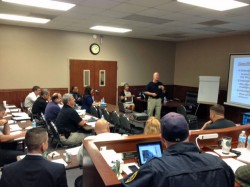Law Enforcement Investigators Attend GBI Class in Royston
Investigators from local and state law enforcement agencies are in Royston at the Royston Police Department this week attending training by the Georgia Bureau of Investigation.
GBI Agent in Charge for the Athens office Mike Ayers has been conducting classes this week on the fundamentals of conducting interrogations and interviews with suspects and witnesses.
Topics covered over the three-day seminar include Methodology, elements of an interview, behavior symptom analysis and elements of an interrogation.
Ayers said it’s important that local agency policies and procedures work in tandem with the GBI.
“What we (GBI) generally do, is serve as a force multiplier. We pair ourselves up with that local investigator. So ultimately what will happen is when we get into that crucial interview, it will be with that local investigator or agent. And if everyone understands fully, the method and the method is universal across the board on how we proceed with these things, the interview will be much more effective in the long run.”
Ayers said the class he is teaching this week is the same class he teaches new GBI agents.
This week’s 3-day seminar is one of several being conducted and sponsored by the Northern Judicial Circuit District Attorney’s office.
District Attorney Parks White and his staff are also attending the seminar this week.
White said the goal is to make sure interviews are conducted in such a way that suspects who are guilty, say they are guilty, but he said that can be a tricky legal tightrope for an investigator to walk.
“There’s a lot of law that goes with making sure that a person is properly advised of their rights before they are questioned,” White said. “And then there’s a lot of law that deals with how, even after you begin questioning them, not saying anything that would render their statement involuntary.”
White said it’s important to avoid giving a suspect a ‘hope of benefit,’ i.e., not saying anything that might make them believe that talking about what they know and confessing might be in their interest.”
“Mike knows the law very well in this area,” White said.
White said there have recently been changes in federal law with regard to interviewing suspects who have invoked their right to an attorney regarding when that suspect might be interviewed again.
“Just a few years ago, the Supreme Court said if a suspect is no longer in custody two weeks after they’ve invoked the right to counsel, the police can go back and ask them about the incident again even without a lawyer, once they’re re-advised of their rights,” White said. “
White said his job and Ayers’ job is to be available to provide input on points of law.
“The reason our military operate so well is that they have, comparatively, hundreds and hundreds of hours of training,” White said. “We don’t have that luxury. We have to be in the trenches everyday.”
White said that means what law enforcement has to have is these kinds of seminars with experts that have good police investigative techniques that work.
“After their three days here, these guys will have to call back upon this training for perhaps years to come. So it’s a matter of getting the people who know the stuff better than anyone else,” White said.

